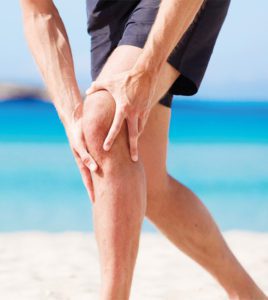 Arthritis can leave your joints feeling stiff and uncomfortable. As we are now in the summer season, you may have noticed that your body is feeling particularly tender. This is due to the ever-changing weather patterns in Southwest Florida and summer storms that bring higher humidity and lower barometric pressure. The rapid transition of weather causes a disparity between the pressure of fluid in the joints and falling barometric pressure outside, increasing pain and inflammation in the joints.
Arthritis can leave your joints feeling stiff and uncomfortable. As we are now in the summer season, you may have noticed that your body is feeling particularly tender. This is due to the ever-changing weather patterns in Southwest Florida and summer storms that bring higher humidity and lower barometric pressure. The rapid transition of weather causes a disparity between the pressure of fluid in the joints and falling barometric pressure outside, increasing pain and inflammation in the joints.
If your joint symptoms have worsened in the summer months, a few minor changes can help you cope with the stormy summer weather in Florida. If you are aware of a predicted sharp rise in temperature or humidity, neutralize this by using a dehumidifier in your home to help draw out the moisture. If the warm weather is troubling your joints, utilizing your air conditioning or a fan will keep your house cool and create a more comfortable environment. With the guidance of your doctor, medication can also be increased as a counteractive measure to the weather.
Your diet can help fight the pain of arthritis. While it is important to maintain an overall healthy diet, eating cool, moisture-filled foods can also help your body reduce inflammation in the summer. Avoiding foods that generate body heat and substituting for watermelon, citrus or leafy greens will give your body relief. Other foods that provide additional benefits are cherries, broccoli, carrots, tomatoes, red bell peppers and strawberries.
While arthritic pain may make you want to avoid regular exercise, it is important to remain active. Exercise increases blood flow to the damaged cartilage and strengthens the muscles that surround the joints, making them capable of handling greater weight, which reduces pressure on weight-bearing joints. Exercise also helps with weight loss by preventing additional weight from being placed on the joints.
Exercise is key to easing the pain of arthritis and is said to prevent or delay the need for hip surgery. Your workout program should include range-of-
motion, strengthening and cardio exercise in order to reduce stiffness, build muscle mass and improve overall fitness. There are many routines that will provide the results you are looking for, but it is important to start slowly and to choose low-impact exercises to protect your joints. The Centers for Disease Control and Prevention suggests that throughout the course of a week, adults with arthritis should get 150 minutes of moderate aerobic activity, 75 minutes of vigorous aerobic activity or an equal combination of both. Adults should also be completing muscle strengthening exercises two days a week and balancing exercises three days a week.
It is important to listen to your body when you are exercising to ensure that you are not causing more pain. The Arthritis Foundation offers a few guidelines to follow to ensure that you are exercising at a level that is healthy for you:
• The Talk Test – When performing cardio exercise, “If you can talk but not sing during an activity, you’re probably working at moderate intensity – enough to improve fitness, but not to the point of risking injury.”
• The Strength Test – During weight lifting exercise, if you can complete two sets of 10 repetitions in good form with a two-minute rest between sets, you are on the right track. If you are unable to do this, reduce your weight. If this was a breeze, try using heavier weights for both sets.
• The Two-Hour Pain Rule – After your workout, if you joints are in more pain than before your exercise, then you have overexerted yourself and should choose a more moderate workout next time.
• Tracking Your Heart Rate – “First, calculate your approximate maximum heart rate by subtracting your age from 220. Then multiply that number by .50 and by .75. That will give you a target heart rate range of 50 percent to 75 percent of maximum heart rate.” Monitor your heart during workouts by using a heart rate monitor or by checking your pulse for 10 seconds and multiply by six to track beats per minute.
Arthritis affects approximately 50 million adults in America. Don’t let the summer season keep you from living the life you deserve. Use these tools to help you enjoy the sunny Southwest Florida lifestyle. It is important to discuss your plan with a doctor and tailor these resources to provide the best routine for you.
Edward R. Dupay, Jr, DO Board Certified
Dr. Dupay graduated from Xavier University in Cincinnati, Ohio. He received his Doctor of Osteopathy at the University of Health Sciences, College of Osteopathic Medicine in Kansas City, Missouri.
Dr. Dupay completed his Internship and Orthopedic Surgery Residency at Flint Osteopathic Hospital in Flint, Michigan. Dr. Dupay has been in the Fort Myers / Cape Coral area since 1987. Dr. Dupay enjoys seeing the “Weekend Warrior” athlete.
Orthopedic Assoicates
239-768-2272 | www.ifixbones.com










